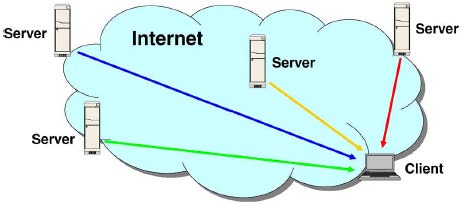We propose a sender-driven system for adaptive streaming from multiple servers to a single receiver over separate network paths. The servers employ information in receiver feedbacks to estimate the available bandwidth on the paths and then compute appropriate transmission schedules for streaming media packets to the receiver based on the bandwidth estimates. An optimization framework is proposed that enables the senders to compute their transmission schedules in a distributed way, and yet to dynamically coordinate them over time such that the resulting video quality at the receiver is maximized. To reduce the computational complexity of the optimization framework an alternative technique based on packet classification is proposed. The substantial reduction in online complexity due to the resulting packet partitioning makes the technique suitable for practical implementations of adaptive and efficient distributed streaming systems. Simulations with internet network traces demonstrate that the proposed solution adapts effectively to bandwidth variations and packet loss. They show that the proposed streaming framework provides superior performance over a conventional distortion-agnostic scheme that performs proportional packet scheduling on the network paths according to their respective bandwidth values. The scenario under consideration is illustrated in Figure 1 below.

Figure 1. Distributed streaming: multiple senders—single receiver.